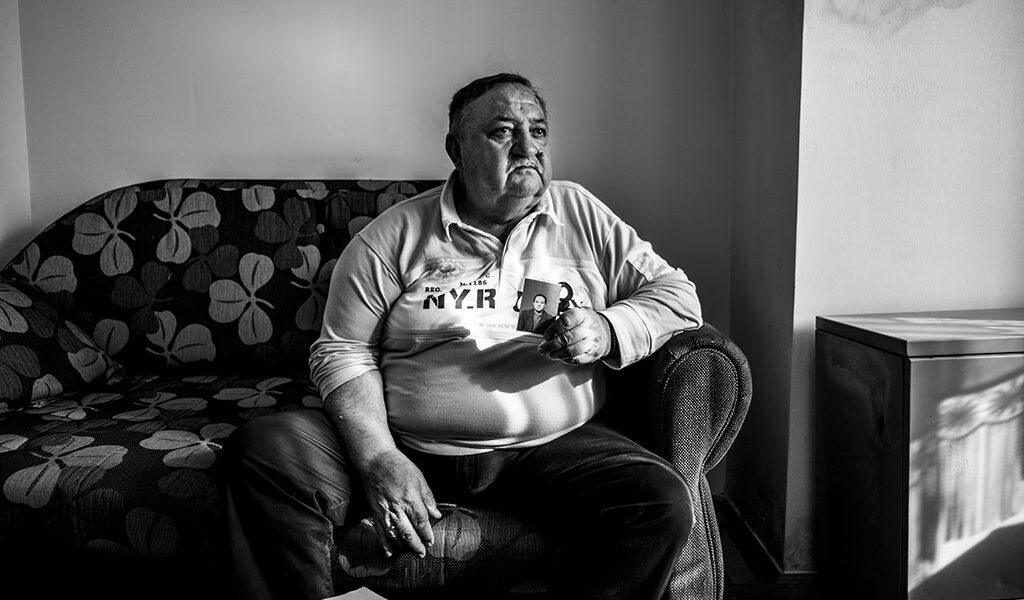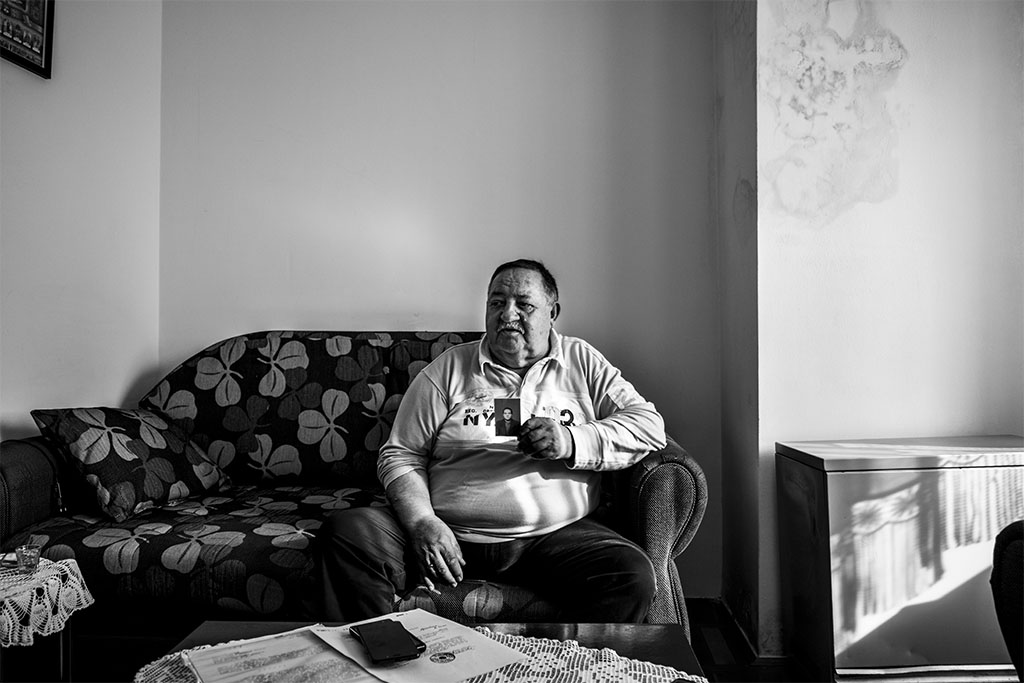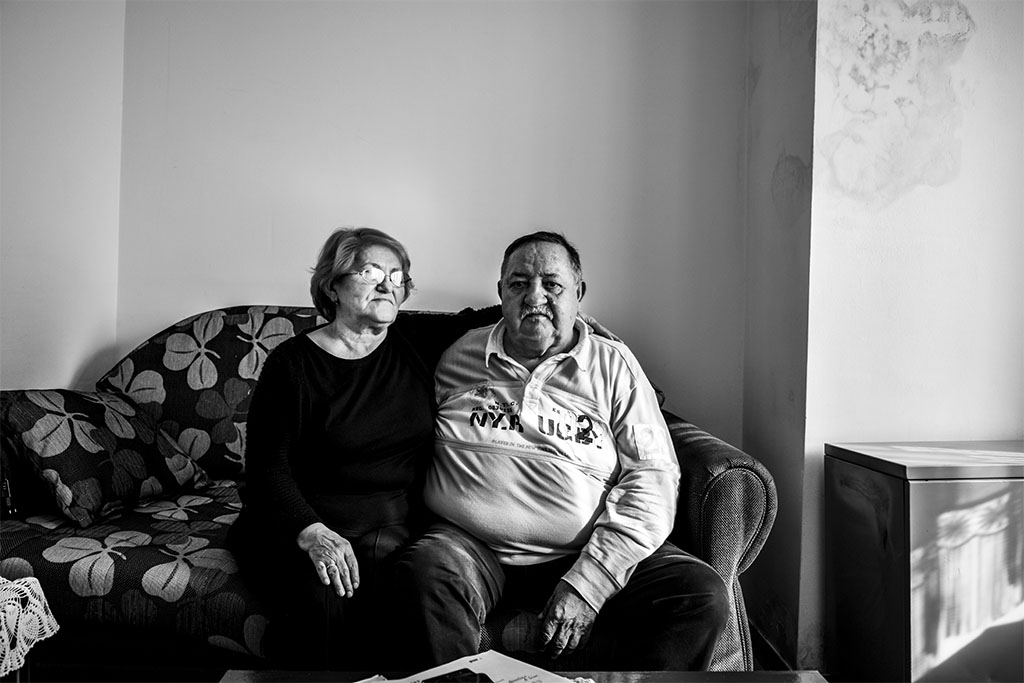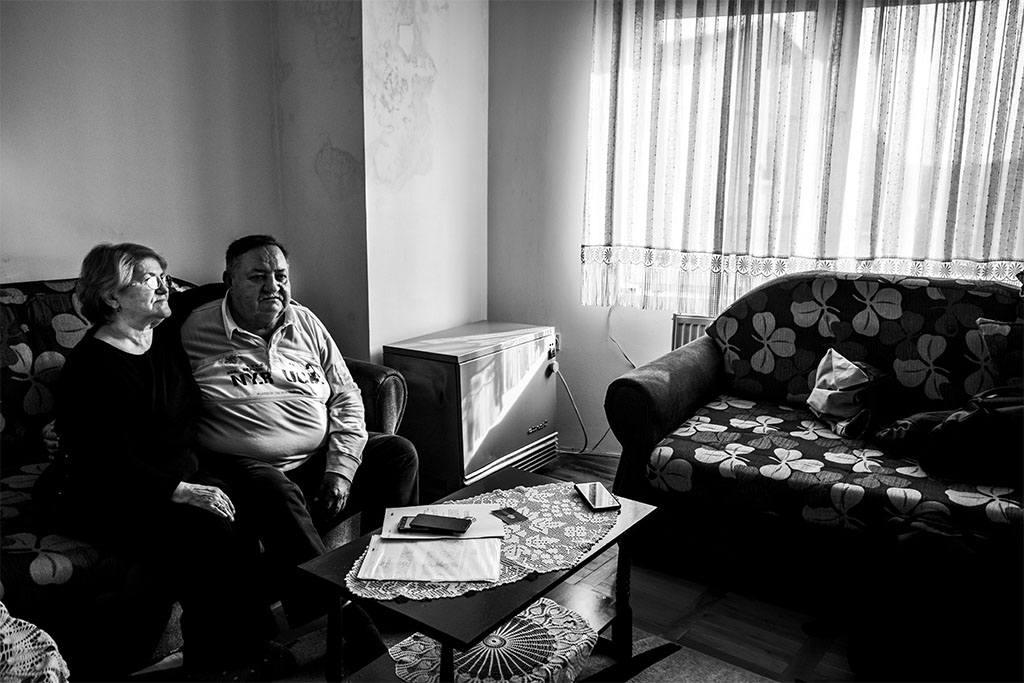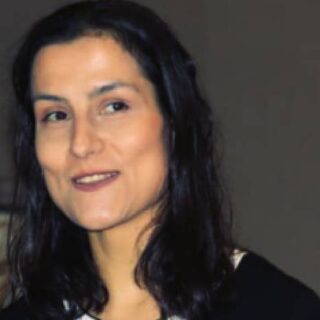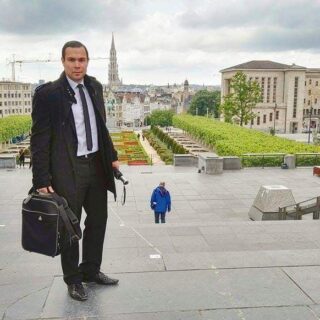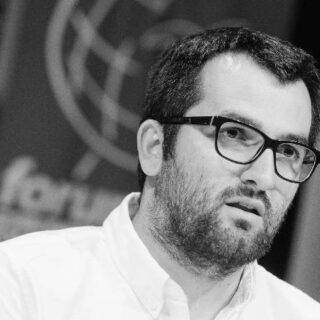INTERVIEW WITH: MILORAD TRIFUNOVIĆ
Miroslav Trifunovic had returned to Kosovo after several years of living abroad. He was 43 and was thinking of marrying and creating a family. He worked in the Belacevac surface coal mining. He even built a floor of the house he would live in when he married.
In June 1998, he was about to go to the beach with his girlfriend, so they would have the wedding when they came back. One morning he was going to work with some colleagues to get the salary before leaving for vacation. His brother Milorad, a member of the Commission for Missing Persons in the Government of Kosovo, shows that this would be the last time he saw him alive.
Milorad Trifunovic: Narration in first person
I was born in the village of Slakovc in the municipality of Vucitrn. There I lived until I was 8 years old. When the village school was closed, I had to live in the village of Plemetin with my grandparents, mother’s parents, and until the seventh grade I went to school in Priluzje. Then I came to Vucitrn. We have been displaced from the village in Vucitrn where the mother and father worked. The father was Tito’s warrior; he went as a soldier as a minor, and therefore he only completed four years of school. But at that time he was a director of an agricultural cooperative.
I had four brothers, now I have two left. I also have a sister. My father died in 2004 and mother in 2008. We lived in a working family, very happy. I had a grandfather, a grandmother, and two aunts. They have gone their way, and my grandparents died. We have stayed in Vucitrn and were among the most valuable families.
Father was even a jury member in court until we left, as well as at the peace council at the time, where there were five Albanians and a Serb, a kind of closed organization formed by the people of villages to resolve conflicts, largely non-national. He pacified both Albanians and Serbs alike, when they had problems because of their field and land borders. There were sometimes hits with an ax, shovel or broom involved, but people were alive. These were the sort of advice that prevented people from ending up in courts, but solved their problems peacefully.
There was more tolerance among people then. I suffer for those times when we lived happily, worked, went to each other for weddings, religious holidays, Christmas, sacrifices, baptisms, and so on. There have been good times. They will never come back; at least I will not experience them. But I will fight for them to return.
I had a very difficult childhood. I was the first child of my parents and always the victim of everything. I started to work since I was little. In the seventh and eighth grade I went to the farm cooperative, digging the earth, earning money for the family, because families with many members tend to eat a lot.
Then, all the brothers came to work for strong companies. The missing brother worked for Hydro-Montage in Belgrade, and at the Obilic power plant, as well as my wife later, a brother worked for Bellacevac mine, and one was also vice-president of the municipality of Vucitrn. He has completed the faculty, the high technical school, which at that time was stronger than the faculties today. I first graduated from the school, but I could not get hired, so I did a course for the crafts, then I enrolled into the high technical school and I became an engineer.
I worked in Power Plant Kosova B, as a supply and innovation engineer, and I received the 1st May award. I worked with Albanians and later, in the overhaul I have led, we were 34, of them only 6 Serbs. Another Albanian colleague later received the May 1 reward. Then it was the greatest reward given to Kosovo and Metohija for innovation. This is the stamp that I show to my grandsons, and they look at it with admiration and sometimes they ask me, “Grandpa, you really were a worker.” And I’m fine. I have seven grandchildren and I want them all to become workers, to work, to live, not to be ashamed of any work, except for the evils and thefts.
I have assembled the Albanians in the overhaul group and a group of defects I was leading because they were happening in the center, so I was dealing with the biggest problems and we had the best workers and craftsmen. When I was in need, I was released from work for three days and I took responsibility for it myself, but I told them that when I get a break I come to the door of your house, you must come. Then we did not have mobile phones, but we knew the knocking signals at the door, four tapes knew that I was.
I met my wife at work. We were married in 1975 with all the customs: the municipality, church, weddings, and my Albanian colleagues attended it too. My wife stood near me for so long, and I loved going out to pubs, socializing. But in 1972 I bought a car and I did not dare to get drunk because I always drove. My company drank, and I sometimes got two beers, sometime one only. Then there were not many police, but the roads were not good, we were more afraid of the road than the police. Therefore, I still do not overdo it with drinks.
After we all got jobs, we started to live right, we built four houses in Vucitrn, and so we were one of the strongest families. I had a 260-square-foot house in the center of Vucitrn, opposite the church. It is still there, the house that used to be mine. It is not ruined, it is near the road, and the three other houses were burnt. When KFOR came, my father gave them the keys to my home. They have been there and have watched everything fall behind the house, but they have not reacted.
My missing brother was called Miroslav Trifunovic. He was born in 1954. He disappeared three weeks after his birthday. In 1998 he was 43 years old. He had completed the technical school in Mitrovica. Then he completed the courses for welding, electro, aluminum and others. He was an expert on such things, he has had good salaries. Money attracts people, if someone is paid well, they try to learn. He worked in Belgrade but returned in 1992 to work here. In Belacevac there is a flat place where it worked. He wanted to marry when the war broke out but failed. He had been working for six years, with interruptions, for an international pipeline from Siberia to Western Europe. He was an expert, even got acquainted with some of the English he wielded for, and then twice went to Heathrow, London, where he wound up wielding the aircraft. The salary was incredible.
But my brother decided to return. We had a large parcel of 16 acres that we split fraternally and built our homes there. He also built a large house, had completed one floor, where he could live separately from the parents, and he could not make the other floors. He did not want to work abroad, he wanted to get married. And it was really time for him to get married. He was hired in the Belacevac mine. I had found this job for him, since then I was chairman of the union, not in the mines, but in the power plant. But I had colleagues, we were a joint venture. I also told him that I would transfer him to the power plant because then there was no competition in the power plant, but as an expert I wanted to transfer him, and he would be well adapted to the company. But he did not want it, because Belacevac is also 20 km far from the power plant and on the other side, it takes an additional hour’s drive. He had taken friends there and did not want to come. Now I’m sorry he did not come but what is there to do, such was his luck.
He was expecting an annual leave on Monday and Wednesday to go with his girlfriend to the sea, and get married when they return. He was going to work to get his salary then leave for a vacation. He went with a car, and had some colleagues in it. Police blocked the road, told him not to go because there was turmoil there. They waited until two more cars arrived. There were three of my colleagues in the one, while in the other one also a colleague who said, “Let’s go, big deal.”
There were also other kidnappings, but in other cases they kept people for only one night and then released them, but they did not release these ones. Before them, another was kidnapped on May 12, and they did not release them, and these were kidnapped on June 22, 1998, when our government was still here; the Serbian authorities, Serbian police, Serbian army.
The biggest problem is that he did not leave a family behind, nor did he get married. I had another unmarried brother, and two brothers were married, had their own homes. Miroslav lived in the family home with his father, mother, and the other single brother. He was a traveled man, had gone through everything. He spoke English to some degree, but perfect Russian. He had spent a lot of time in Russia, also knew German, which was a bit better than his English. He helped everyone, and had a huge salary to do so, since he worked abroad.
The last time we were together was one night before he was kidnapped, when we watched the Yugoslavia-Germany match. We were delighted with the game. It was a very fierce match, the result was in our favor, and we were screaming, drinking, joking, no one foretold that something bad could happen. The date was June 21, 1998. It was me, he and another of those guys who disappeared, in our cafeteria in Vucitrn, the only Serbian cafe.
The cafe was managed by my younger brother, as he was in Vucitrn and had not gone out. He was also vice-president of the municipality, but not at that time, before that. Then he left politics because in politics you have to lie and deceive. I apologize to politicians, but I think so and yet nobody has managed to convince me that I’m not right. Soon I will be 71 years old and still none of the politicians have convinced me that I’m not right about what I think.
Towards the end of the game came a colleague from Gojbula village, about three kilometers away from Vucitrn, and asked, “Did you receive the salary?” He said, “I did not get it and I do not have to, I have money, I’ll get it when I come back. He said, “Why when you come back? Do you see what the situation is like?”
My brother told me, “I’m going to get my salary, I have to report back to work.” The state of Serbia has decided on a certain set of rules for work, and they must be respected, because whoever does not follow such rules loses their job. My brother had already made the decision, but money was always needed. He did not really need it. But he had a car and went to bring his colleagues back and forth.
The next morning, his brother’s colleagues came at 5:30. He was sleeping; they woke him up. I have not seen him at all, but I know what he was wearing: adidas shorts, adidas sneakers, and an adidas dress. At 9:15 am an Albanian arrived. I had come to town to buy newspapers and go back to the cafe because I had taken a break and planned to go to the sea with my wife and children. He told me what happened to my brother. When they came to the parking lot, they were called upon by some people in KLA clothes and some in civilian clothes who pulled them out of the car. My brother asked them, “What is this?”, but they placed a revolver to his head and put him in the back seat. One person was sitting at the wheel and so they robbed the car. This Albanian described it all in detail and told me by name and surname of someone who had recorded it all with a camera. They were prepared for something like that. They told me that they all had a camera. He told me that he then entered the bus. He lived in Pristina. This was the last time that someone saw him alive.
That day I immediately went to the Red Cross in Pristina, to the International Committee and announced the case. The Americans had an information and cultural center in Pristina but were dealing more with political issues. I went to them and reported the disappearance of all whom I knew, then I informed my parents, brothers and sisters. Then we all went together to the International Committee of the Red Cross, then to the EPS union, then called the Kosovo Power Plant.
We organized bus transport to Belgrade, we went to embassies in Belgrade, because then there were no embassies in Pristina. We have reported to the OSCE Mr. Walker. He has accepted us more to respect the order, but I have to admit he behaved correctly. We went to Belgrade, stayed there for five days, we met the non-governmental organizations and all the institutions that wanted to accept us.
Natasa Kandic admitted us immediately and was very correct with us. When we went to Sonja Biserko, she did not want to accept us. Then I used a trick via someone I know in Belgrade, a former colleague in Obrenovac, who knew Sonja, we went to her and she said to me literally: “What can be done now? They just are not no more, you have to overcome the pain and that is how it ends.” I said, “Will you overcome your brother’s pain?” And she said to me, “You have deserved it too.” “Excuse me? – I asked amazed. She said, “You deserved it.” I said, “Way to go!”, and rose to me feet. But I did not make any trouble. My friend took me out and I do not know what happened during the day, because I was totally shocked. It’s stupid to say something like that, even to your biggest enemy. It is another thing that she deals with politics and does whatever she does, but to say so to someone is stupid. I cannot even say this to anyone today. But there are different monsters and she is one of those monsters as far as I am concerned.
I have met many politicians in relation to this kidnapping, both in Belgrade and Pristina, and they have all promised that this will be the first topic that will be discussed in the dialogue between Belgrade and Pristina. It has never been realized so far, and now we have a promise. Personally, Thaci has promised me that the first topic to be discussed will be this, and now he is really involved, but there is no dialogue right now. This is politics. The worse for the people, the best for politicians.
Later we have received a variety of information. I have the names of people, all the conversation files, and written statements. Our father was very active on this issue, has gone to the villages. There was also a woman, an Albanian, I know her name, she asked for ten thousand marks in order to tell us what she knew. And the father has agreed to give her the money. We did, because we were three brothers, ten thousand marks then could buy you two flats in Belgrade. She came one day, my father in 1998 worked as chairman of pensioners in Vučitrn, everything was still Serbian and Serbian institutions worked until KFOR came.
Later, different things happened, there was murder on sides, kidnappings, disappearances, things because of which we did not dare to leave our homes. Then Albanians began to leave their jobs. They did not leave the power plant, because there had to be some sort of partition. Belacevac mine that supplied the Kosova B coal-fired power plant would belong to the Albanians, and the mine that supplied the Kosovo A Power Plant would belong to those working there, meaning that it would be led by Albanian managers, because 8 percent of Serbs, 2 percent of others and 90 percent of Albanians worked in my headquarters, but we never had any problems. There in Kosovo A the relations were quite different, 40 to 40 percent and nobody did anything wrong, a skilled worker was always appreciated.
Then the bombing began. We did not leave Vucitrn even when there was bombing. We went to work. I was not at work, I was sick, but my wife went to work from Vucitrn to Obilic. I know the plants stopped working when the first bombings began. I was chairman of the union of Kosovo B at that time, and the General Director told us … his brother was also kidnapped along with my own that day. His brother was called Marijan Buha, but they called him Mirko. He was in the third car alone. In the second car there were three cousins Adjancic from Raskovo and Milosevo, while in my brother’s car were Savić Srbolub and Bozhidar.
Half an hour after their kidnapping, they have kidnapped three workers with those small bulldozers so that ten people disappeared within half an hour. When the bombings ceased, the Frenchmen entered Vucitrn, Albanians began to return because they were placed in the Sitnica Muslim cemetery. There were really a lot of them. We insisted that we open the bakery to work just for them, even the flour we gave to our neighbors. Especially civil protection worked, the bakery worked, everything worked. It is true that many of them had gone, but more than 70 percent remained.
Albanians who did not want to go to the KLA happened to be harassed and kidnapped. They asked for money from 10,000, 1 thousand Euro. We know all this, here we have lived side by side. Nor did we forget solidarity, especially those of us that had kidnapped or missing family members. We had Albanian neighbors, even during the war we even broke the wall between our houses, because there were 102 to 108 people in the neighbor’s house, mostly women and children. With the brothers we brought milk and bread. We’ve never done anything bad in life, we just helped. They had no idea what was happening to them there, how they were tortured, how they tormented them. Now we have all the documents, after the war here we bought video tapes registered by members of the KLA. I also have all the books in the office, for the kidnapped and the missing, with pictures and records of all the missing.
When the French soldiers came, they said, “Get away because we cannot protect you. After Vucitrn, beyond Sitnica, in Cicavica, they have put barricades. The army cannot stop the KLA. They want to get revenge. “We said we were not frightened by anyone, we did nothing and the French replied, via the interpreter they had: “You think they can tell who did something and who did not? Those who will come are not from Vucitrn, who knows where they are from. ” So, you are a Serb, go to Serbia or you will lose your head. We removed the women and children, and myself, my youngest brother with the mother and father remained here.
Then the younger brother went to Mitrovica. Took me a lot of convincing him to do so, I gave him my car and said, “Go!” I stayed with the father and mother. I told them to go to the basement. We stayed there for two nights. Everyone left Vucitrn, but we remained. Our Albanian neighbor came to us and said, “Rade, for God’s sake, convince your parents to leave too, since there is nothing we can do. They want to force us, your neighbors, to kill you, and you have fed us during wartime. ” I said, “What?” He swears in his children. I called my father out. He said, “I do not want to leave, let them kill me, but I will not leave.”
A Frenchman whom we called Frog called me. Four soldiers took me by car to Jugopetrol pump at the exit for Mitrovica. There was a tank parked there. He said to me, “Get down here!” Further, the crowd was gathered, it seemed to me there were millions of them, I could see them trampling on one another. I saw that picture, and he tells me to go down to them. I went out and immediately climbed into the tank. I was not so fat then, I had 95 to 96 kilograms, not as I am now with 110 kilograms or more. I climbed to the tank that soldier offered me a rifle, and the crowd turned to me, swearing at me. Then spoke a sensible man, I do not know who he was, he said, “Lose that, he is a good man …” Then a few others, five or six of them, joined him.
So, I went up to that tank and some soldier came from downstairs, I do not know his rank. The crowd went through these soldiers trying to stop them, since no one can stop a crowd. He shot up over their heads. The tank left and sent me to Smrekovnica. From now on there was no one.
When you go from Vucitrn to Mitrovica, no Albanian houses are burnt. There were no burned houses in Vucitrn either. I can freely say that all Albanian burnt houses in Vucitrn were burnt by Albanians themselves, because Serbs had no reason to do so. Those who burned them have targeted those who worked in Serbian institutions who did not leave their work, those who did not send their boys into the army, and so on.
I went to Leposavic, and I stopped in a house that had only the walls to shelter us. We calculated that we would return for 15 or 20 days. I came up with a pair of worn jeans, I had a pair of old broken shoes. We did not even have any luxurious outfits, we had sneakers, but who remembered to look for them in such a time. So, I walked slowly from there to Mitrovica, went to the priest in the church, because my house in Vucitrn was opposite the church, so I knew the priests. I phoned my dad, I told him I had arrived in Mitrovica. He was happy to learn that I arrived, but I said, “I spoke to my neighbor, his son will send you to Mitrovica, and I’ll wait for you.” “No!” he told me.
Then came KFOR, and my father gave them the keys to the house because this neighbor persuaded him to do so. I met my father and mother in the cemetery, took them and brought them to Batacino, where I had an aunt. As a union leader I took a vacation in Vrnjačka Banja, Kraljevo’s distribution, and there we put all the families of the kidnapped from Kosovo, where I brought my father and mother with my younger brother, while my wife and I were in Leposavic.
Later I bought a flat in the center of the city, however half of it was paid and the other half paid when the transaction was completed. I bought it from an Albanian who fled to Serbia. He told me, “I cannot venture to make the apartment transaction.” So, we did it at the Court of Raska, but I said, “Until I come to Mitrovica to make the transaction, I will not give the money left.” He told me, “No problem,” because I had given half of the money to him.
Then we estimated that the apartment was worth 20 thousand marks. I had given 10 thousand and then I was left without money. In fact, I borrowed it to give it to him, because I had money in my savings account in the bank, but where would I keep my money at home in time of war? In fact, I do not need to keep them today, I have good life, good pension, good family life, granddaughters, grandsons, everything is super, and I only miss my brother, whose bones I cannot find. If I could find and bury him with dignity as a man, I would place the tomb, I would know where to put flowers … My father and mother died in Kraljevo and they were buried there, and we went to fire candles for them and weep for my missing brother.
We weep for him, because my senses tell me that he is not alive. The criminals have killed other witnesses, and they would never spare those they kidnapped. They are monstrous. How can someone kill someone for nothing? I could not even kill a chicken, and alone kill someone over nothing. After all, he did not even live in Kosovo, he was out, and he could make no one angry. He really lived with Albanians, Serbs and all the rest. Even now his colleagues, Albanians, especially those two years since I came to Pristina, came to remember him and really regretted his death.
I think that it is in the interest of both Belgrade and Pristina to resolve this issue, as well as for us who have lost our loved ones. For us this is a priority on priorities, we would give everything we have to resolve the situation. I do not have much, but I would give all I have just to see him come back. Would sleep on the streets, just to have him back … If they could only return his bones, I would give everything, seal everything and rent a place to live in.
But governments in Pristina and Belgrade are also misusing our suffering for their political goals. They have promised us that the first topic of conversation in Brussels would be to uncover the fate of the missing, and to this day they have not even talked about it. They talk about everything, I know that people who live are a priority, their energy, water and supplies are a priority. We really feel blocked, we have no drugs, and we have to go to Raska. There is no milk, eggs. There is some, but not enough. If you find it fine, but if not … There should be flour, there is no bread either, but I would say to Ramush Haradinaj: “Come live in the north for a while, but with your family, and see how you will live even though you are a prime Minister! “.
Yes, it is difficult to live in enclaves in the south, but we in the north are neither in on earth nor in the sky, we do not know where we are. The biggest problem is the young people; they are our future, our strength, and when they do faculties for different professions there is no place to hire them. If you do not belong to a party, you have failed, you cannot even go somewhere, everything is in vain. We have people with schools working in construction and even there, if they do not work properly, they fail. And what are they working for? For a kilo of flour, and they would not pay them nothing, if they did not need them to come the next day too.
I also told Haradinaj, in a meeting ten days ago in Pristina that I had with him and with Bajram Çerkini. I am also a member of the Commission for Missing Persons in the Kosovo Government, and he came after the meeting, talked with the heads of associations and with us and I said, “Mr. Haradinaj builds factories, or an institution, bring world economists here to help. If not the European Union, then America. It’s no help just making the army, we’re doing it. Build factories, hire people, because our faculties, our schools are working for Americans, Germans, Swiss, and Belgians. “All of our qualified experts have gone out. We educate people who then work in other countries.
It would be useful for the governments in Belgrade and Pristina to put themselves in the position of the families of the kidnapped. They all talked to us and shared our feelings with us. Whether it is artificial or not, I do not know, but I think they are truthful. Because our feelings are very sad and nobody can act, not even those who talk to us.
I did not get into the subject of our nightmares when we dream that they are with us when we wake up with anxiety. This happens to each of us. So, I say, let them put themselves in our position and let them turn towards peace. All that has happened should be left behind. Do not forget, let them remember but not allow to repeat such crimes and for all those murderous monsters, regardless of their nationality, religion and others, for whom they have evidence, they should put them away. Not because of us, but because of the generations to come, so that they see that crimes do not get old and that all those who committed crimes will have to respond for whatever they have done.
Let’s face the future, work for peace, and then all the rest will come, if people agree, if the truth comes to the surface, if we go towards peace. Everyone must go towards peace. It is useless if one party does so and not the other. We must all sit down and talk about a peaceful future, not about what has passed. As for the past, there are courts, institutions and services that deal with these things, and politicians should orient themselves towards creating a peaceful life for people, with good working conditions, and we should not rely on social assistance, since even that cannot last forever.
(This story is part of “Living with memories of the missing: Memory book with stories of family members of the missing from the last war in Kosovo”, implemented by forumZFD program in Kosovo and Integra, in cooperation with Missing Persons Resource Centre, with the support of Federal Ministry for Economic Cooperation and Development (BMZ), Rockefeller Brothers and Swiss Embassy in Kosovo)
